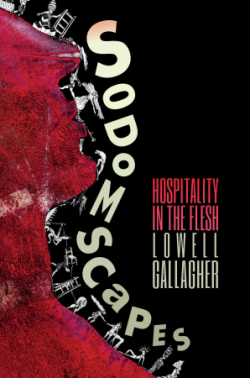English Chair Lowell Gallagher publishes new book “Sodomscapes: Hospitality in the Flesh”

Lowell Gallagher’s new book, Sodomscapes: Hospitality in the Flesh, was published with Fordham University Press in 2017. Sodomscapes presents a fresh approach to the story of Lot’s wife, as it’s been read across cultures and generations. In the process, it reinterprets foundational concepts of ethics, representation, and the body.
While the sudden mutation of Lot’s wife in the flight from Sodom is often read to confirm our antiscopic bias, a rival tradition emphasizes the counter-intuitive optics required tonurture sustainable habitations for life in view of its unforeseeablecontingency. Whether in medieval exegesis, Russian avant-garde art, Renaissance painting, or today’s Dead Sea health care tourism industry, the repeated desire to reclaim Lot’s wife turns the cautionary emblem of the mutating woman into a figural laboratory for testing the ethical bounds of hospitality. Sodomscape—the book’s name for this gesture—revisits touchstone moments in the history of figural thinking and places them in conversation with key thinkers of hospitality. The book’s cumulative perspective identifies Lot’s wife as the resilient figure of vigilant dwelling, whose in-betweenness discloses counter-intuitive ways of understanding what counts as a life amid divergent claims of being-with and being-for.
“Lowell Gallagher’s Sodomscapes is a stunningly learned and creative engagement with the ethics of looking back–looking back at a past littered with the calcified remains of those rendered mute by traditional Western Christian and philosophical morality and looking back at the other in a pose of vulnerable and creative welcome to a radically unknowable future. Attending to the figure of Lot’s wife in a wide range of images, texts, and imagetexts from across the Jewish and Christian traditions and into secular modernity, Gallagher shows that Sodom was always about the double edge of hospitality. In the process Gallagher uncovers and creates a ‘counter-memory of Lot’s wife’ in which homelessness and home, stranger and beloved, danger and hope stand in radical proximity” (Amy Hollywood, Harvard Divinity School). Learn more here.